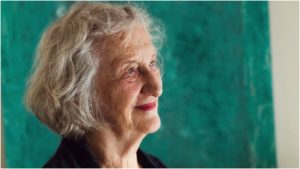
Composer Profile: Thea Musgrave, A True Trailblazer
By Gillian Reinhard(Credit: Bryan Sheffield)
Scottish-American composer Thea Musgrave has distinguished herself over the course of a long and prolific career. Many of her works have emerged as some of the most important operas of the late twentieth and early twenty-first centuries.
Musgrave was born outside of Edinburgh in 1928 and later studied at the University of Edinburgh. As a burgeoning music student, she worked directly with Nadia Boulanger in Paris and later with Aaron Copland at Tanglewood. Later, she moved permanently to the United States as a professor at the University of California, Santa Barbara and then at Queens College, City University of New York. She married American opera conductor Peter Mark in 1971.
In addition to more than a dozen operas, Musgrave also composed notable pieces such as the Concerto for Orchestra (1967), Concerto for Horn (1971), “Helios” oboe concerto (1994), and “Turbulent Landscapes” (2003) among many others. Much of her music became instantly successful upon their premieres, which set Musgrave apart from other composers at the time. Later, she became the first woman to conduct one of her own compositions at the Philadelphia Orchestra.
Musgrave’s long career has earned her many accolades, such as two Guggenheim Fellowships, the Queen’s Medal for Music, a Commander for the Order of the British Empire, and five honorary degrees. Her work has recently been honored at the BBC Total Immersion Weekend (2014) and the Stockholm International Composer Festival (2018), according to the composer’s website.
Most Famous Works
Musgrave’s earliest opera was “The Abbot of Drimock” in 1955, which was based on a Scottish Border ballad. By 1967, Musgrave completed “The Decision,” her first full-length opera. This became an important example of Musgrave’s dynamism, as the work explored atonality.
The style of Musgrave’s music has come to be defined by asynchronous music with an emphasis on soloists. This is apparent in her operas which tell the stories of notable figures from history and literature. They include: “The Voice of Ariadne” in 1972, which featured Musgrave’s first explorations of electric sounds; “Mary, Queen of Scots” in 1975, which included Musgrave’s own libretto; and “Harriet: A Woman Called Moses” in 1985, which marked Musgrave’s growing interest in American history after her move to the United States.
Her most recent opera, “Pontalba,” focuses on the life of Micaela Almonester in nineteenth-century New Orleans. “Pontalba” commemorates the 200th anniversary of the Louisiana Purchase.
Watch & Listen
Soprano Jenny Sandelin sings “Mary, Queen of Scots” in Celebration of Thea Musgrave’s 90th Birthday (2018)
Soprano Christine Lyons and Mezzo-Soprano Geraldine McMillian sing a duet from “Harriet, The Woman Called Moses” in Celebration of Thea Musgrave’s 90th Birthday (2018)
Soprano Jenny Sandelin sings an aria from “Simón Bolívar” in Celebration of Thea Musgrave’s 90th Birthday (2018)
Thea Musgrave in Interview
Categories
Opera Wiki

